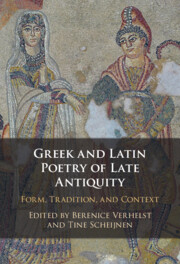Book contents
- Greek and Latin Poetry of Late Antiquity
- Greek and Latin Poetry of Late Antiquity
- Copyright page
- Contents
- Figures
- Contributors
- Introduction
- Part 1 A ‘Late’ Perspective on the Literary Tradition
- Chapter 1 Rivalling Song Contests and Alternative Typhonomachies in Ovid and Nonnus
- Chapter 2 Greek and Roman Epigrammatists in the Later Imperial Period
- Chapter 3 Allusion and Referentiality in Late Antique Epic
- Chapter 4 Speaking from the Margins
- Part 2 Late Antique ‘Genres’ and ‘Genre’ in Late Antiquity
- Part 3 The Context of Late Antiquity
- Bibliography
- General Subject Index
- Index Locorum
Chapter 4 - Speaking from the Margins
Paratexts in Greek and Latin Poetry
from Part 1 - A ‘Late’ Perspective on the Literary Tradition
Published online by Cambridge University Press: 16 June 2022
- Greek and Latin Poetry of Late Antiquity
- Greek and Latin Poetry of Late Antiquity
- Copyright page
- Contents
- Figures
- Contributors
- Introduction
- Part 1 A ‘Late’ Perspective on the Literary Tradition
- Chapter 1 Rivalling Song Contests and Alternative Typhonomachies in Ovid and Nonnus
- Chapter 2 Greek and Roman Epigrammatists in the Later Imperial Period
- Chapter 3 Allusion and Referentiality in Late Antique Epic
- Chapter 4 Speaking from the Margins
- Part 2 Late Antique ‘Genres’ and ‘Genre’ in Late Antiquity
- Part 3 The Context of Late Antiquity
- Bibliography
- General Subject Index
- Index Locorum
Summary
Paratexts of all kinds became more significant as antiquity wore on. The Homeric epics, for example, and Herodotus’ Histories were not originally divided into books; the canonical book divisions were made only in the Hellenistic period. Despite evidence for the spread of paratexts, editors and scholars often ignore them. They do so, in part, because paratexts are inherently unstable texts; and yet, as ephemeral products of their own literary culture, paratexts provide precious evidence for how poetry was read at any given time or place. The first goal of this chapter is to the collate evidence for section headings, illustrations, and prefaces being produced for poetic texts in the East and West in Late Antiquity in Latin and in Greek. The second goal is to compare their use in each tradition and to analyze where the cultures either converged or departed in their use of paratexts. The evidence collated reveals that new paratextual forms appear around the same time in Greek and Latin, but that there are also separate developments in each tradition.
- Type
- Chapter
- Information
- Greek and Latin Poetry of Late AntiquityForm, Tradition, and Context, pp. 69 - 88Publisher: Cambridge University PressPrint publication year: 2022

